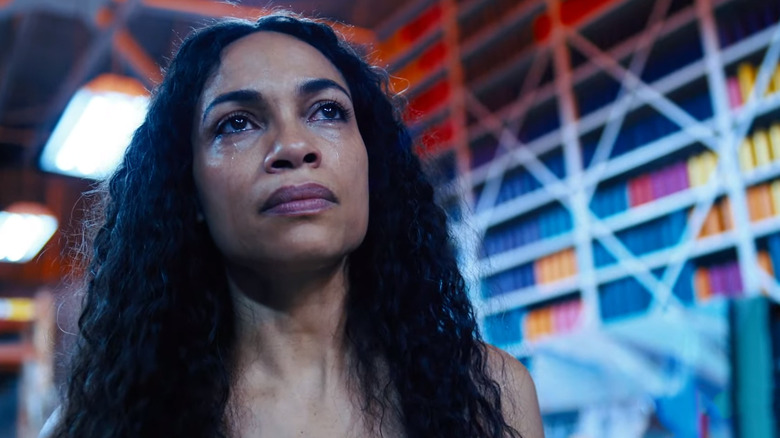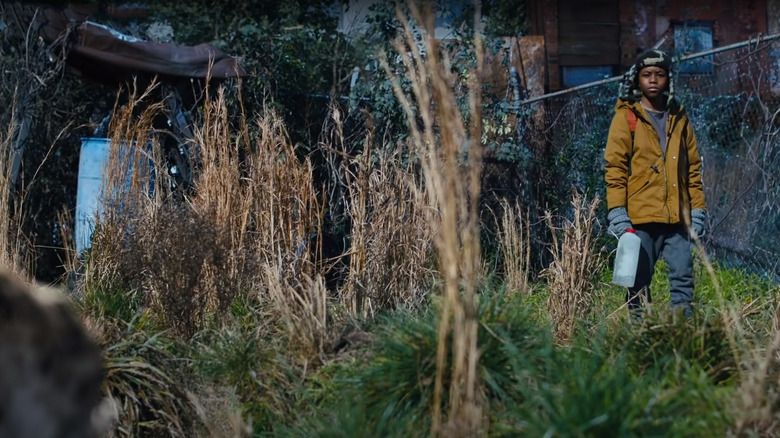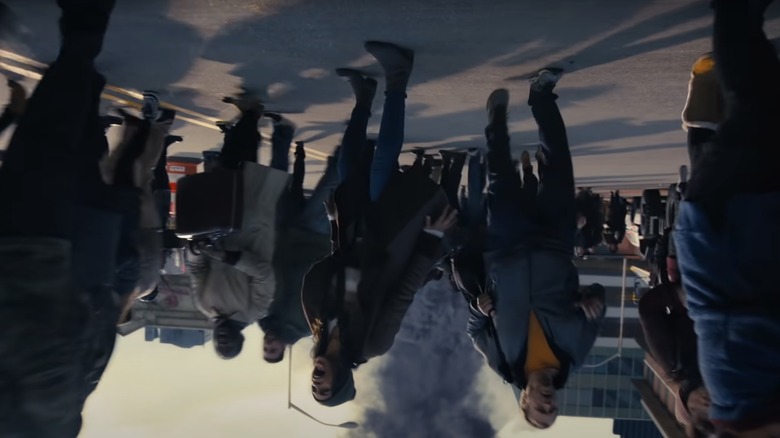DMZ Review: A Well-Crafted Tale About Hope In The Face Of Hopelessness
Dystopian fiction has been pretty popular on television for a while now, thanks to shows like "The Walking Dead," "The Handmaid's Tale," and "Snowpiercer." As our own world feels increasingly unfriendly, many turn to dystopian dramas to feel less alone in their fears, or get some type of survivalist wish-fulfillment. Most dystopian shows are incredibly heavy, dealing with the darkest parts of humanity in blunt and brutal ways. In the end, they all walk a careful balance between inspiring hope and fear, reminding us that we're always one step away from being survivors ourselves.
"DMZ" is based on the comic book series of the same name by Brian Wood and Riccardo Burchielli, though it makes some big changes right out of the gate. You won't see the comic's protagonist, Matty Roth, anywhere. Instead, we follow Alma Ortega (Rosario Dawson), who later takes on the moniker of "Zee," and is based on the medical student character from the comics. "DMZ" is set in an alternate near-future, in a timeline where the United States has fractured due to a second American Civil War. Manhattan becomes a demilitarized zone (DMZ) between the United States of America and the Free States of America. The two nations have come to a ceasefire, but the DMZ is a tinder box waiting to ignite and possibly bring the war back to an active conflict.
The series starts with Zee, a doctor, breaking into the DMZ one night with 24 hours to get back across the border. She wants to look for her son, Christian (Freddy Miyares), whom she lost during the evacuation of Manhattan. It's been six years since she was forced to flee, and she's spent that time searching for Christian in both the USA and the FSA. The only place he could possibly be is in the DMZ, leading Zee to hire someone to sneak her in. The first episode follows her as a fish out of water, trying to reconcile her memories of the place she once lived with what it has become. Memory plays a heavy role in "DMZ," as various characters cling to their memories as a means of survival. Zee is fearless in the face of just about everything and anything because she has so desperately latched onto the memory of her son. Dawson is absolutely incredible as a fierce mama bear — and she's not some flawless flattened heroine, but a character that's both challenging and challenged. She makes mistakes. She's overly cocky, sometimes to a point of being fatally foolhardy. But she's also deeply empathetic and kind, with a strong sense of morality that she refuses to let slip.
Zee soon becomes caught up in an ongoing battle for the streets between two rival gangs, each led by men from her former life. Parco Delgado (Benjamin Bratt) is her ex-husband, a gangster even before a war that took over the Latin Kings inside of the DMZ. He controls about half of the city, while Wilson (Hoon Lee) runs Chinatown and his own gang. Wilson and Zee worked together at a medical clinic before the war, and they remember one another fondly. She seeks out the two men, hoping one of them knows something about Christian, and that's when she's forced to deal with this new reality.
The sacrifices of survival
"DMZ" starts like one thing and becomes another after its first episode, so sharing too much more of the plot would be a disservice. What begins as a "The Walking Dead"-style scenario with a grim, all-too-real aesthetic soon turns into a story about the power of community, true democracy, and standing up for what you believe in. There are moments where the series could lean into its tragedy, but thankfully these moments are brief. Zee is on a mission, after all, and taking time to process her trauma as it happens isn't exactly on the table. Instead, "DMZ" shows us how each of these survivors, from the gang lords to the street kids, manages to get by because of sacrifice.
Parco and Wilson sacrifice their humanity, growing their power with the blood of others. Zee sacrifices her time, energy, and safety. Odi (Jordan Preston Carter), a young boy who befriends Zee early on and serves as her guide to the DMZ, sacrifices his childhood. The parts of themselves these survivors choose to give determines not only their survival but what kind of person they will eventually become, as forged by their trauma.
As Zee gets more involved in the gang wars of the DMZ and an upcoming election for governor that pits Parco against Wilson, she starts to question her own sacrifices. More importantly, she questions her purpose and sets out to not only save her son from the DMZ, but to save the DMZ from itself. The back half of the limited series is a heart-pumping criminal political thriller that digs deep into communal identities and tribalism. Zee is a total outsider, and her perspective shakes up the DMZ enough to maybe change it forever.
The world-building in "DMZ" is phenomenal, and a huge part of what makes the series sing. Even the most tertiary characters are given traits to make them memorable, and they each get their own tiny arcs. Just as the series tries to teach us, everyone matters in a true democracy, from the folks at the top all the way to the city's most impoverished. Care was given to every single character, and similar attention has been paid to the various settings. The DMZ feels appropriately lived-in, with its own subcultures, styles, and slang. The score from Kris Bowers ("Space Jam: A New Legacy") is excellent, mixing rap, trip-hop, salsa, and more to create a sound that's perfect for a neo-Manhattan. A cover of Massive Attack's "Angel" is one of the only needle drops, and it takes place during a key sequence that is sure to give some viewers chills. The cinematography from Matthew J. Lloyd ("Colin in Black & White") is stellar, ditching the faded grungy filters of most dystopian TV in favor of lots of colored lighting and high contrast. The series looks appropriately comic book-inspired with its color pallet and occasional Dutch angles, but it never goes as far as pastiche.
Keep moving
There are tiny moments throughout the series that tell the viewer everything they need to know about the world without a single line of dialogue. One such scene features Odi's young friend Nico (Venus Ariel) as she discovers the body of a dead gangster. She immediately starts rifling through his jacket, completely unfazed by the horror in front of her. When she discovers a gold-plated pistol, she's thrilled and holds her prize like a girl her age in our world might hold the latest iPhone. She's been so hardened by her time in the DMZ that she has become almost feral, and she's a perfect example of how repeated trauma forges people into something different.
Thankfully, the series points out that trauma can also make us better, as long as we acknowledge it and do something to break the cycles of violence that caused it in the first place. There are lessons here about not only the way big events like war and violence impact us, but also the ways we can traumatize one another without even knowing it. Sometimes the bonds of family and identity can be a curse, and only some kind of sacrifice can set you free. There are many kinds of survival represented in "DMZ," and it forces us to question the human desire for power, and why some seize it all for themselves. It also questions the very nature of power, and how sometimes the most powerful are simply those who give a voice to the people.
Fans of "Sons of Anarchy" are bound to enjoy the series, as showrunner Roberto Patino wrote a number of episodes for that series, and his understanding of gangland "law and order" is on full display. Ava DuVernay directed the pilot, which is tonally rather different from the three other episodes directed by Ernest R. Dickerson. Dickerson has directing credits on a number of apocalyptic and dystopian shows like "Under the Dome," "The Walking Dead," "The Man in the High Castle," and "The Purge," and his steady hand helps keep the show on the rails and focused on its deeper themes without ever getting too lost in the weeds.
No one ever thinks that their home could turn into a war zone, but it's always a possibility. While some viewers might find the series a little too relevant and topical, its message of hope in the face of hopelessness sets it apart from many of its dystopian contemporaries. There's violence, pain, and suffering, but it never feels exploitative or intended for shock value, and the disturbing moments often pass quickly, providing tiny reminders of the stakes without ever becoming maudlin. In the end, "DMZ" seems meant to inspire us and remind us of our own power, even when the road ahead seems impossible. Zee has a phrase she used to tell her son when things got tough: "eyes forward, love." The trick is to keep moving and never look back, without forgetting what you learn along the way.
/Film Rating: 8 out of 10
"DMZ" premieres March 17, 2022, on HBO Max.


